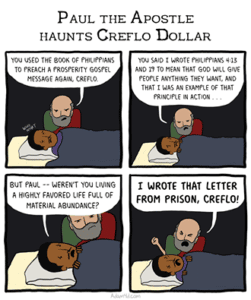
Authorship unknown. Copyright information will be listed if received. Used under fair use for commentary purposes.
I saw the comic above on Facebook. It reminded me of how often certain doctrines can only be upheld if one carefully “cherry-picks” the available information. This is also called “quote mining” in some quarters. It is often used in both print and television media, as well as some so-called documentary films. It is also a frequent flyer in Facebook, where many memes will correctly quote someone, but so out of context or in such a limited fashion that the person appears to be supporting one’s own personal view. It has also been a strong staple for centuries among Christians who want to find support for their particular doctrinal stance. Among them is Creflo Augustus Dollar.
So, how is quote mining used to change Saint Paul’s meaning to appear to support Pastor Creflo’s ministry? Let’s look at the two verses cited, Philippians 4:13 & 4:19. I will quote them, but separate them only by an ellipsis so that you may read it as one sentence. “I can do all this through him who gives me strength. … And my God will meet all your needs according to the riches of his glory in Christ Jesus.” With a bit of stretching, one could end up preaching and concluding that God will provide for all our needs with his riches. That is, that if we but believe, we can do all that we want, and all our needs would be met. There is only one problem, and that is that the situation from which Saint Paul is writing is not a situation which would normally be considered a situation of living in abundance.
Saint Paul was imprisoned, held captive. In verse 14, he says, “Yet it was good of you to share in my troubles.” And in verse 16 he says, “… for even when I was in Thessalonica, you sent me aid more than once when I was in need.” This is not the boasting of a man who was full of health and wealth. Rather, this is the writing of a man who says that in Christ, he can suffer and survive all that the world can toss at him. He can survive shipwrecks, flogging, prison, etc., “… through him who gives me strength.” At the same time, he is grateful that the Philippians provided for him more than once when he, “… was in need.” This is the opposite of a health and wealth gospel, this is a Gospel of standing tall during a time of suffering. God can richly provide what you need in order to survive and grow more and more into his likeness. And, if necessary, God can provide the courage to die faithfully, as Saint Paul, and so many martyrs, did.
Too many pastors, such as Pastor Creflo, area cherry-picking verses in order to support doctrines that paint God as a God who wishes you to be rich. But, that is not surprising. Whether rightly or wrongly, post-Puritan Calvinists have been accused of assuming that a good Christian will also be a reasonably well-off Christian. The same is true in England, and I suspect in many other countries as well. Since the times portrayed in the Book of Job, the tendency of Jewish and Christian believers has been to fall into the thought that if you are reasonably faithful, you will be well-off. Given some of the blessings and curses found in the Book of Deuteronomy, it would be easy to assume that if you have material blessings, then you must be following God somewhat faithfully.
The Book of Job is the philosophical response in which God tells us that material wealth is no indication whatsoever of spiritual health. In fact, suffering troubles and loss of material wealth may also be an indicator that one is faithful. Neither wealth nor lack of wealth correlate with spiritual standing. If anything, Scripture points out over and over how too much wealth can so easily lead to unfaithfulness. From Solomon amassing wives to Dives ignoring Lazarus, the accumulation of wealth leads to strong temptation to backslide. Meanwhile, the poor are often addressed as those who may have more opportunity to be spiritual. “Blessed are the poor …,” says the Lord. There is no equivalent line for the rich. One need only read the Early Church Fathers to see how this tends to be their attitude as well. And that is no surprise, given the early persecutions. Pastor Creflo reverses that trend to claim that God wants you materially wealthy now.
But, I think what bothers me most is not Pastor Creflo, but rather myself. I started to ask myself how many times have I done that type of Scriptural “exegesis?” How many time have I cherry-picked Scriptural quotes in order to support my conclusions? How often do I read the Early Church Fathers looking for support? How often is what I say a search for what I want rather than for what is true? So, I see Pastor Creflo’s story both as a clear example of quote mining, yet also as a clear warning to me to watch myself as I read and study Scripture and the writings of the Fathers.



Leave a Reply